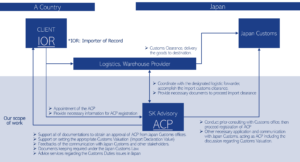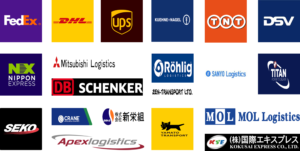Mandatory Use of ACP in Many Cases - Don't Easily Designate Third Party as the IOR - Act Now!
Last Updated on April 27, 2024 by SK ADVISORY INC
As previously mentioned in another article ("Announcement from Japan Customs | Mandatory to Use ACP in Many Cases – Attorney for Customs Procedure"), from October 2023, overseas sellers, especially those on e-commerce platforms like Amazon, Rakuten, and Shopify, are now necessary to utilize ACP and become the Importer of Record (IOR) themselves. Therefore, schemes involving designating other Japanese corporations as the IOR are no longer feasible. Despite clear directives to this effect, we observe certain IOR businesses providing unauthorized IOR services.
The prevalence of such questionable practices necessitates this article as a cautionary note. Sellers operating in Japan must strive to understand and comply with the correct legal framework and avoid unnecessary penalty.
Problematic Practices – Violation of Customs Laws
There are instances where transactions seem to exist between overseas businesses and Japanese IORs (who are merely importers in name), with manipulated documents like invoices reflecting undervalued declared prices for customs clearance. In reality, these goods are not directly shipped to fulfillment centers like Amazon but temporarily stored in domestic warehouses. Here, they are labeled before being sent to the final fulfillment destination. This scheme aims to avoid detection by customs as e-commerce products. Such actions are illegal and not in compliance with the law, and I strongly urge an immediate cessation of these practices.
Importing through illegal schemes often leads to undervalued import declarations. Even if customs clearance is initially granted, subsequent Post Clearance Audit by customs can lead to substantial penalties. Legally, the IOR is liable for these payments, which can lead to disputes between overseas sellers and IOR businesses. Typically, the financial burden of import duties and taxes falls on the overseas sellers, making conflicts predictable.
Both the uninformed overseas businesses using these illegal schemes and the IOR operators bear responsibility.
Observing extremely low prices for products by overseas sellers on e-commerce platforms like Amazon often gives an impression of an unfair competitive environment. Legitimate overseas businesses pay appropriate taxes and add these costs to their selling prices, putting them at a disadvantage against sellers who avoid proper tax payments. This unfairness is precisely why the customs system was revised in October 2023.
For businesses with low compliance awareness, the issues likely extend beyond just declared values. Often, they might also be non-compliant with intellectual property laws and other regulations.
Concerns Over Cost Impact of Customs Valuation/Import Declarations
When overseas sellers import goods for e-commerce into Japan, whether through ACP or as the another IOR company, there is no "import transaction" with a Japanese buyer, leading to the exceptional determination method for declared import values, typically based on the domestic selling price.
There are concerns about high valuation leading to excessive duties and taxes. However, this is a determination method based on the Customs Tariff Law, which must be adhered to. The cost impact of the valuation is not as significant as often feared.
The taxes on import are mainly customs duties and consumption tax. Japan’s import tariffs are relatively low on a global scale, and many industrial products are duty-free. As for consumption tax, which is a uniform 10%, it is an indirect tax borne by the final consumer, not a cost for the overseas seller. Taxable businesses regularly file consumption tax returns to the tax office, adjusting the tax paid on imports against the tax collected from sales, neutralizing the cost impact. However, this necessitates that the overseas business itself becomes the importer, achievable only through using ACP.
With the start of the consumption tax invoice system in October 2023, many overseas businesses might have registered as qualified invoice-issuing entity. For B2C businesses, registration as a qualified invoice-issuing entity is not always necessary, but many companies seem to register without fully understanding the system. I recommend that overseas businesses seek advice from qualified professionals to navigate these changes correctly.
As seasoned experts in customs and trade facilitation, we at SK DVISORY are here to navigate these complexities on your behalf. Our approach, grounded in professionalism and profound regulatory knowledge, ensures a seamless, compliant, and strategic entry into Japan's vibrant market.
We invite you to reach out to us — let's discuss how we can support your business's successful and compliant expansion into Japan. Your peace of mind is our top priority.
We look forward to your inquiry!
Our ACP Service: The Best Solution for the Japan Importer of Record (IOR)
Attorney for Customs Procedures (ACP) is the best solution for addressing the issue of Japan IOR - Importer of Record. Below is an outline of our primary services and a diagram illustrating the operational structure of the ACP service. Upon successful ACP registration, a foreign entity can become the Japan IOR - Importer of Record.
Basic Scope of Services:
- Consultation with the Japan Customs Office for successful ACP registration.
- Liaising with stakeholders, including Logistics Forwarding Companies and the Customs Offices, on behalf of non-resident clients (i.e., non-resident Japan IOR) to ensure the secure importation of goods.
- Assistance in preparing the necessary documentation for import clearance.
- Support of calculation of Customs Value (Customs Valuation Formula), in accordance with appropriate compliance under the Japan Tariff Customs Law.
- Security Export Control (Classification for List Control, Examination for Catch-All Control, Application of the license to Ministry of Economy, Trade and Industry)
- Documents keeping, required under article 95 - Japan Customs Law
- Providing professional trade/customs advice if any issues arise.
**Both import and export activities can benefit from the use of an ACP (Attorney for Customs Procedures). This support is applicable in scenarios where a non-resident acts as the Importer of Record (IOR) for imports and as the Exporter of Record (EOR) for exports.
Three Steps to Initiate Shipments Under the ACP Program: :
-
Quotation Review to Contract Conclusion: Upon receiving your contact details, we will promptly provide a quotation for your review.
-
Commencing the Registration of ACP (Attorney for Customs Procedure) to Japan Customs: This process is generally completed in about two weeks.
-
Initiation of First Shipment, Import/Export

Japanese Customs System Reform: Clarification of Importer Definitions
Starting October 1, 2023, Japanese Customs has instituted a pivotal reform aimed at addressing the issue of foreign sellers improperly designating third parties (such as forwarders or customs agents) as importers.
This revision necessitates foreign corporations to utilize an Attorney for Customs Procedures (ACP) to assume the role of Importer of Record (IOR) directly in many cases. The practice of merely nominally appointing another entity as the importer is no longer feasible.
Notably, foreign corporations that act as importers themselves, through the engagement of ACP, are eligible for Japan Consumption Tax (JCT) benefits. (link: Consumption Tax Treatment and Benefits of Using ACP).
As a dedicated ACP firm, we ensure compliance with the law to facilitate correct import procedures, allowing you to trust us with your importation requirements confidently. We are eager to engage in further discussions with you.
Revisions Effective October 1, 2023:
Definition of the Importer
- Regarding a cargo imported under import transaction, an importer is equivalent to “a person who imports a cargo” defined in Article 6-1 (1), General Notification of the Customs Act. ..... This means, the Consignee, etc., in the case of imports conducted through normal transactions between an overseas seller and a Japanese buyer
- In the cases other than above, an importer is a person who has a right to disposition of the import cargo at the time of import declaration. If there is another person who acts on the purpose of the import*, that person is also included :
In case of a cargo imported:
- under lease contracts, a person who rents and uses the cargo.
- for consignment sales, a person who sells the cargo in the name of himself/herself (consignee) by accepting the commission.
- for processing or repairing, a person who processes or repairs the cargo.
- for disposal, a person who disposes the cargo.
For additional information, please refer to the following resources:
- Japan Customs: Leaflet(English) Revision of Import Declaration Items and Attorney for Customs Procedure (ACP) System
- English: Announcement from Japan Customs | Mandatory to Use ACP in Many Cases – Attorney for Customs Procedure
Our Customers - Japan IOR / Attorney for Customs Procedures (ACP) Service
All our clients have successfully become Japan Importer of Record (IOR) and imported goods into Japan under our guidance.

Logistics Companies with Collaboration Experience
Here is a list of our partner logistics and forwarding companies with whom we have had successful collaborations. Please note that this list is not exhaustive, as we are open to working with any logistics or forwarding companies. As Attorneys for Customs Procedures (ACP), we represent non-resident clients (IOR) and coordinate with these logistics companies, who manage the transportation of goods to and from Japan.

Please Be Aware
In cases where foreign corporations (non-residents) without an office in Japan import goods, failure to properly prepare an Importer of Record (IOR) through an Attorney for Customs Procedures (ACP) or similar means can result in goods being held at customs, leading to significant delays and costs. To avoid such risks, please make thorough preparations.
If an ACP is needed, it is crucial to utilize the services of an experienced ACP well-versed in customs-related laws and regulations. The import and export operations of non-residents/foreign corporations using an ACP are treated as unique cases. Many customs brokers are not familiar with these procedures, leading to incidents where goods are detained for extended periods due to unsuccessful explanations to customs. (Customs will not permit the import if the explanations provided by the importer or customs broker are unsatisfactory, resulting in the goods being detained until customs is convinced.)
We highly recommend utilizing our services as professional experts in customs, knowledgeable about customs-related laws and regulations. With a proven track record of resolving numerous issues through direct consultations with customs officers and customs brokers, our clients supported as an ACP now exceed 100 companies. We are committed to delivering industry-leading results with our expertise.
Why choose us?
- Customs and International Trade Professionals - Our CEO, Mr. Sawada, is a Certified Customs Specialist in Japan. With years of experience providing services in the Trade & Customs field, his leadership at KPMG and the establishment of his own company, SK Advisory, ensures our commitment to excellence and high-quality service.
- Full Adherence to Japanese Customs Law - Our top priority is to maintain full compliance with Japanese Customs Law and safely import / export our clients' goods into / from Japan. We meticulously manage all import compliance aspects, including Japan Importer of Record (IOR) matter, HS code classification and the correct Customs Valuation of goods entering Japan. We support to complete all the necessary shipping documents, such as Invoice, Packing List and BL, on behald of non-resident / foreign Japan IOR.
- Communication in English, Chinese, and Japanese - Our team, with extensive international experience, excels in communication in English, including facilitating English-language meetings, and has earned considerable trust from clients. We also have staff capable of communicating in Chinese, making us equipped to handle Chinese-language support as well. Naturally, as a Japan-based team, we're totally fluent in Japanese, ensuring seamless communication across these three key languages.
- Reputable and Reliable Partner -The growing demand for our Attorney for Customs Procedures (ACP) services is testament to our quality. We proudly serve clients globally, registering over 50 ACP customers annually. Our consistent track record underscores our reliability and credibility. For a detailed list of our clientele, please visit our "Experiences" section. Our unwavering commitment ensures all our clients successfully acquire Japan IOR status and import goods seamlessly into Japan.
- Recognized ACP Service Provider on Amazon SPN (Service Provider Network) - We are a certified ACP service provider within Amazon's Service Provider Network (SPN), listed under the Trade Compliance category. Many international Amazon Sellers have successfully become Japan Importers of Record (IOR) through our ACP services.

FAQ for ACP (Attorney for Customs Procedures)
What is the role of ACP (SK Advisory)?
- Representation: ACP (SK Advisory) represents the foreign importer and liaises with Japan Customs and the Forwarding Company/Customs Broker.
- Documentation and Compliance: ACP assists in preparing essential import documents (e.g., Invoices) in compliance with Japan Customs Law and formally requests the Customs Broker to proceed with customs clearance.
- Expert Consultation and Troubleshooting: We are a team of legal experts in Customs Laws, providing direct consultations with Japan Customs to ensure compliance and address issues, including troubleshooting unique challenges in non-resident imports.
How long time does it require to get ACP’s registration?
It will take approximately 2 weeks until getting an approval from Japan Customs Office.
The breakdown of the task is as follows.
- Prepare the necessary documentation between us
- Start pre-consultation with Japan Customs Office and proceed initial review
- Submit paper-based set of application documents to Japan Customs Office for final review
What kind of documents to be necessary for ACP application?
Not limited, but for instance - Power of Attorney, Company Registry, The calculation method of Customs Valuation, Catalog of the import goods, business/logistic flow
ACP can handle all kinds of goods?
ACP, is not capable to handle all kinds of goods. If the goods are subject to specific regulations requires importer to be resident in Japan, such goods can not be handled under the ACP. Restricted regulations are, for instance, Act on Pharmaceuticals and Medical Devices, or PSE/PSC.
Which regions in Japan are we covering?
Any region in Japan, we can handle.
What is difference between ACP and IOR?
ACP is not the Importer. ACP enables non-resident entities to become IOR (Importer of Record).
-----
For more basic information (Illustrated and Video)
- What is ACP? - Attorney for Customs Procedures
- Steps of using ACP, how foreign entity can import into Japan by ACP
- What is IOR? – Importer of Record
- Amazon won’t become an IOR
ACP insights
ACP insight 1-Customs Valuation
ACP insight 5-ACP Qualification
ACP insight 6-What kind of cases require for ACP?
ACP insight 9-ACP Import under VMI - Vendor Managed Inventory
ACP Service for Importer of Record (IOR)
ACP Service for Exporter of Record (EOR)
IOR Service for Food Tools, Kitchen Tools, Tumblers, Cutlery
Tax Representative Service (Consumption Tax)
Guidance by Amazon
According to the seller central website in Amazon, there is guidance by Amazon that a non-resident entity needs to appoint an ACP or IOR. You may check on this link:
Non-resident requirements
A Fulfillment by Amazon (FBA) seller who lives outside of Japan (non-residents) and would like to import goods into an Amazon Japan fulfillment center for storage and order fulfillment must first designate an Import of Record (IOR) and /or Attorney for Customs Procedure (ACP). This must be accomplished in advance of any importations. In general, any person who is a resident of Japan can be appointed as an IOR and/or ACP. Neither Amazon nor any of its entities in Japan may act as the IOR/ACP on the customs declaration, only the FBA seller or their designated IOR/ACP.
Amazon, Seller Central, Japan Tax and Regulatory Considerations
Also, you can check the document developed by Amazon "Understand ACP and IOR guidance".
Understand ACP and IOR
If you do not have a Japanese entity to act as the importer of record, it is mandatory that you appoint an Attorney for Customs Procedure (ACP). Overseas Sellers, as non-resident importers, can generally rely on a program called ACP to help bring their inventory into Japan. An ACP is a resident Japanese entity who registers with Japan Customs as your agent to help with entries and communications. Please note ACP does not fully take over the whole responsibility of an importer. You must ensure that your goods comply with the local laws and regulations as a part of your responsibility.
Amazon, Understand ACP and IOR guidance
Recently, Amazon issued another guidance regarding the Understanding of Attorney for Customs Procedures (ACP) in accordance with the new Japan Customs Regulations that have been effective since October 2023.
Understanding of Attorney for Customs Procedures (ACP)
Understand ACP/CPA
To import your FBA shipment, you may need an ACP (Attorney for Customs Procedures, also called Customs Procedure Agent or CPA; hereinafter ‘CPA’) to support the customs clearance
procedures for your goods. The following materials on the Japan Customs website explains in what situations you need a CPA.
https://www.customs.go.jp/shiryo/jirei.pdfIf you are required to use a CPA, Overseas FBA sellers will be filing import declarations under the seller’s name while using a CPA to help bring their inventory into Japan. A CPA is a resident Japanese entity who registers with Japan Customs as your agent to help with customs declarations and communications. Please note CPA does not fully take over the whole
responsibility of an importer. You must ensure that your goods comply with the local laws and regulations as a part of your responsibility.Please note that the customs territory of Japan is divided into regional areas that do not share information regarding CPA registration. This means you can only rely on your CPA in the region(s) where the application is received. You have to appoint a CPA in each region if necessary. Once you find out the destination Fulfillment Centre (FC) for your goods, please ensure that your CPA is registered in all required regions. For details, you should consult with the relevant customs office.
Are certain product categories limited to Japanese-resident as Importer instead of an ACP/CPA?
There are certain products that are subject to notification, certification, or registration requirements that must be met by a resident Japanese entity who is also responsible for ensuring
the imported goods comply with local laws and regulations. Because these requirements can only be met by a Japanese entity, a non-resident IOR cannot meet them. You are responsible for determining whether or not your goods require a notification, certification, or registration. Japan Customs website has provided an outline of relevant laws and ordinances as a guide but you should also consult with your customs broker or legal advisor. Additionally, all imported products must meet Japanese regulations and product labeling obligations.For more information, please refer to the Japan Customs’ website: http://www.customs.go.jp/
For more information on the 2023 Japan Customs Act Amendment, please refer to the Japan
Customs’ website:
[JP] https://www.customs.go.jp/shiryo/leaflet_jimukanrinin.pdf
[EN] https://www.customs.go.jp/shiryo/leaflet_jimukanrinin_e.pdf
[CN] https://www.customs.go.jp/shiryo/leaflet_jimukanrinin_cn.pdf
[KR] https://www.customs.go.jp/shiryo/leaflet_jimukanrinin_kr.pdf




